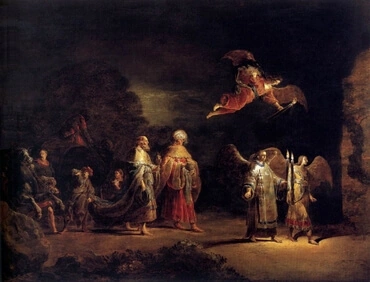7093. 'And let them hold a feast to Me in the wilderness' means in order that they may worship the Lord with gladness of mind, in the obscurity of faith they live in. This is clear from the meaning of 'holding a feast' as worship offered with gladness of mind, dealt with below (the fact that the Lord was the one to whom they were to hold the feast and whom 'to Me', that is, Jehovah, is used to mean here, see just above in 7091); and from the meaning of 'the wilderness' as obscurity of faith, dealt with in 1708, 7055. Regarding those who belong to the spiritual Church, that they live in comparative obscurity of faith, see 2708, 2715-2718, 2831, 2849, 2935, 2937, 3241, 3246, 3833, 6289, 6500, 6945.
[2] The reason why 'holding a feast' means offering worship with gladness of mind is that they were to hold the feast three days' journey away from Egypt, thus not in a state when molested by falsities but in a state of freedom. For a person who is delivered from falsities and from the distress felt at that time gives thanks to God with gladness of mind, and in so doing holds a feast. Furthermore the feasts which had been instituted among those people, three a year, are also said to have been instituted in remembrance of their deliverance from slavery in Egypt, by which in the spiritual sense is meant in remembrance of deliverance from molestation by falsities through the Lord's Coming into the world. They were also told to be glad on these occasions, as is evident in Moses where the feast of tabernacles is dealt with,
At the feast of tabernacles you shall take 1
on the first day the fruit of a fine tree, 2
fronds of palm trees, the bough of a thick tree, and willows of the powerful stream; and you shall be glad before Jehovah your God seven days. Leviticus 23:40
[3] 'The fruit of a fine tree, fronds of palm trees, the bough of a thick tree, and willows of the powerful stream' means joy because of the goodness and truth present in a person from the inmost to the external parts of his being. The good of love, which is inmost, is meant by 'the fruit of a fine tree'; the good of faith by 'fronds of palm trees'; factual knowledge that accords with truth by 'the branch of a thick tree'; and sensory impressions that accord with truth, which are the most external, by 'the willows of a powerful stream'. No command to take all these things would have been given if there had not been some cause lying behind it in the spiritual world; and that cause does not become evident to anyone except from the internal sense.
[4] They were to be glad during the feast of weeks, as is also clear in Moses,
You shall keep the feast of weeks to Jehovah your God, and you shall be glad before Jehovah your God, you, and your son and your daughter, and your male servant and your female servant, and the Levite who is within your gates. Deuteronomy 16:10-11.
These words too, in the internal sense, mean gladness because of the goodness and truth present in people from the inmost to the external parts of their being.
[5] The fact that feasts were times of gladness, so that holding a feast means worshipping with gladness of mind, is also evident from the following places: In Isaiah,
You will have a song like that of a night for hallowing a feast. Isaiah 30:29.
In Nahum,
Look, on the mountains the feet of one bringing good tidings, of one proclaiming peace! Keep your feasts, O Judah, perform your vows; for [the man of] belial 3
will no more pass through you, he will be cut off completely. 4
Nahum 1:15.
In Zechariah,
The fasts will be to the house of Judah ones of joy and gladness and good feasts; only love truth and peace. Zechariah 8:19.
In Hosea,
I will cause all her joy to cease, her feasts, her new moons. Hosea 2:11.
In Amos,
I will turn your feasts into mourning, and all your songs into lamentation. Amos 8:10.
The fact that 'holding a feast' means offering worship with gladness of mind because they had been delivered from slavery in Egypt, or in the spiritual sense because they had been delivered from molestation by falsities, is made plain by the feast of Passover. They were commanded to celebrate this each year on the day of their departure from Egypt; and they were commanded to do so on account of the deliverance of the children of Israel from slavery, that is, on account of the deliverance of those who belonged to the spiritual Church from falsities, and so from damnation. And since the Lord delivered them by His Coming and raised them up with Him into heaven when He rose again, therefore this too was done at the Passover. This is also meant by the Lord's words in John,
Now is the judgement of this world, now will the prince of this world be cast outdoors. But I, if I am lifted up from the earth, will draw all people to Myself. John 12:31-32.
Poznámky pod čarou:







